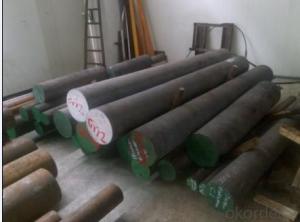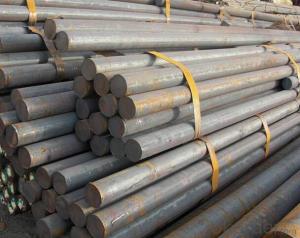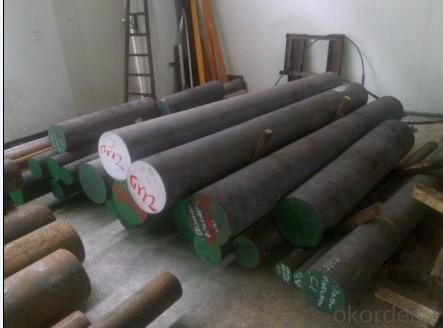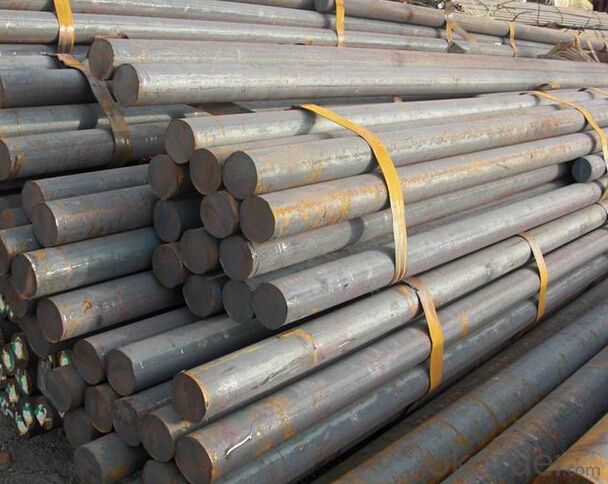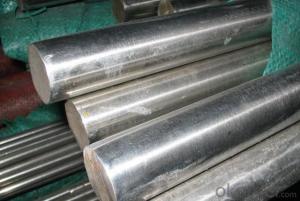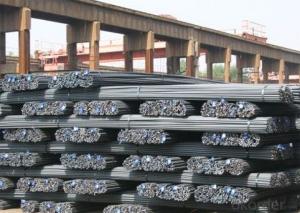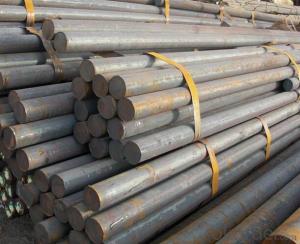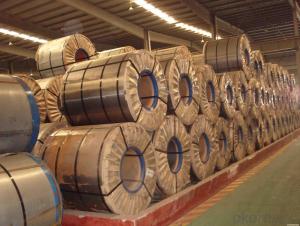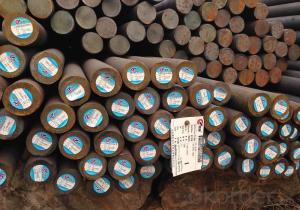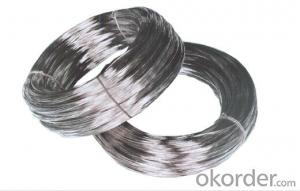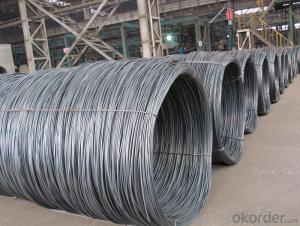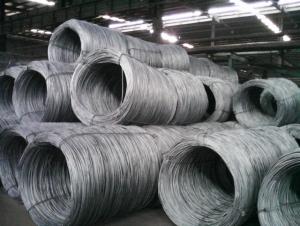Special Steel SCM435 Steel Rod / 4135 Steel Rod
- Loading Port:
- China main port
- Payment Terms:
- TT OR LC
- Min Order Qty:
- 25 m.t.
- Supply Capability:
- 10000 m.t./month
OKorder Service Pledge
OKorder Financial Service
You Might Also Like
Specification
The details of our Steel
1. Produce Standard: as the GB, AISI, ASTM, SAE, EN, BS, DIN, JIS Industry Standard
2. Produce processes: Smelt Iron -EAF smelt Billet - ESR smelt Billet -Hot rolled or forged get the steel round bar and plate
3. Heat treatment:
Normalized / Annealed / Quenched+Tempered
4. Quality assurance:
All order we can received Third party inspection, You can let SGS, BV,.. and others test company test and inspect our products before Goods shipping.
Product information
Chemical Composition(%) of 4135 steel rod | C | Si | Mn | P | S | Cr | Mo |
0.33-0.38 | 0.15-0.35 | 0.70-0.90 | ≤0.035 | ≤0.04 | 0.80-1.10 | 0.15-0.25 | |
Specification of 4135 steel rod | Dia.*L=14~200mm*4000~8000mm | ||||||
Application of 4135 steel rod | extrusion dies and die-casting for aluminu m,mandgnesium alloy mostly,for copper alloy could use mechaincal press forging of steel | ||||||
Payment Term of 4135 steel rod | L/C or T/T,30% in advance,70% before the shipment | ||||||
Main product
Plastic Mould Steel
DIN 1.2311,1.2738,1.2083,1.2316 etc.
AISI P20,P20+Ni,420 etc.
JIS SUS420J2
Hot Work Steel
DIN 1.2344,1.2343,1.2367,1.2365,1.2581,1.2713 etc.
AISI H13,H11,H10,H21, etc.
JIS SKD61,SKD6,SKD5,SKT4 etc.
Cold Work Steel
DIN 1.2739, 1.2601, 1.2080, 1.2436, 1.2631, 1.263, 1.2510, 1.2327 etc.
AISI D2, D5, D3, D6, A8, A2, O1 etc.
JIS SKD10, SKD11, SKD1, SKS3 etc.
High Speed Steel
DIN 1.3343, 1.3243, 1.3247, 1.3355 etc.
AISI M2, M35, M42, T1 etc.
JIS SKH51, SKH35, SKH59, SKH2 etc.
Alloy Structural Steel
DIN 1.7035,1.6511,1.7220,1.7225 etc.
AISI 5140, 4340, 4135, 4140 etc.
JIS SCr440,SNCM439,SCM435,SCM440 etc.
Stainless & Carbon Steel or Others
DIN 1.4125,1.1191 etc
AISI 440C,1045, 1020 etc.
JIS SUS440C,S45C etc
Product show

Workshop show

Shipping
1. FedEx/DHL/UPS/TNT for samples, Door-to-Door;
2. By Air or by Sea for batch goods, for FCL; Airport/ Port receiving;
3. Customers specifying freight forwarders or negotiable shipping methods!
Delivery Time: 3-7 days for samples; 5-25 days for batch goods.
Payment Terms
1.Payment: T/T, L/C, Western Union, MoneyGram,PayPal; 30% deposits; 70% balance before delivery.
2.MOQ: 1pcs
3.Warranty : 3 years
4.Package Informations: 1) EXPORT, In 20 feet (GW 25 ton) or 40 feet Container (GW 25 ton)
2)as customer's requirement
Why choose us?
(1) The leading exporter in China special steel industry.
(2) Large stocks for various sizes, fast delivery date.
(3) Good business relationship with China famous factories.
(4) More than 7 years steel exporting experience.
(5) Good after-sales service guarantee.
- Q: How does special steel contribute to the overall economy?
- Special steel contributes to the overall economy in several ways. Firstly, it plays a crucial role in various industries such as automotive, construction, and manufacturing, where it is used for producing high-performance components and structures. This fosters innovation, enhances productivity, and drives economic growth. Additionally, the production and processing of special steel create employment opportunities, both directly and indirectly, stimulating job growth and income generation. Moreover, special steel exports contribute to trade balance and foreign exchange earnings, further bolstering the economy. Overall, the utilization of special steel in diverse sectors strengthens industrial competitiveness, supports economic development, and fuels economic prosperity.
- Q: How does special steel ensure product traceability?
- Product traceability is guaranteed in special steel through a variety of measures and processes implemented during production and supply chain management. To begin with, detailed records of the production process are maintained by special steel manufacturers. These records encompass information on the raw material source, specific production techniques utilized, and the testing and inspection procedures carried out at each stage. By possessing these records, a comprehensive traceability is achieved as they provide a clear historical account of each product from its inception to its final form. Special steel manufacturers also adopt robust quality control systems that involve assigning unique identification codes or markings to each product. These codes aid in tracking the product throughout its lifecycle, facilitating easy identification and traceability. Furthermore, advanced technology systems such as barcode scanning, radio frequency identification (RFID), or blockchain are often employed by special steel manufacturers to monitor and trace their products. These systems enable real-time monitoring and recording of product movements, thereby ensuring accurate traceability and transparency. Additionally, special steel manufacturers maintain strong relationships with their suppliers and customers, establishing a transparent and traceable supply chain. They collaborate closely with suppliers to validate the origin and quality of raw materials, while also working closely with customers to provide them with detailed information regarding the product's manufacturing process and its journey through the supply chain. In conclusion, special steel manufacturers prioritize product traceability by implementing stringent record-keeping systems, advanced technology solutions, and maintaining transparent relationships with suppliers and customers. These measures not only guarantee the quality and reliability of special steel products, but also provide customers with assurance regarding the origin and authenticity of the product.
- Q: Can special steel be used in the manufacturing of tools?
- Yes, special steel can be used in the manufacturing of tools. Special steel, also known as alloy steel, is specifically designed to have enhanced properties such as high strength, hardness, and resistance to wear and corrosion. These characteristics make it an ideal material for the production of durable and high-performance tools used in various industries, including automotive, construction, and machinery.
- Q: What are the factors that affect the weldability of special steel?
- The factors that affect the weldability of special steel include the composition of the steel, including the presence of elements such as carbon, alloying elements, and impurities; the heat treatment history of the steel; the thickness and shape of the steel; the welding process and parameters used; and the skill and experience of the welder.
- Q: What are the properties of high-temperature alloy steel?
- High-temperature alloy steel possesses several important properties, including excellent strength, resistance to corrosion and oxidation, exceptional heat resistance, and the ability to retain its mechanical properties even at elevated temperatures. These alloys are specifically designed to withstand extreme heat and pressure, making them ideal for applications in industries such as aerospace, power generation, and oil and gas.
- Q: How is special steel used in the production of automotive springs?
- Special steel is used in the production of automotive springs due to its high strength and durability properties, which are essential for supporting the weight of the vehicle and providing a smooth ride. The special steel's unique composition and manufacturing processes ensure that the springs can withstand repeated stress and maintain their shape over time, enhancing the overall performance and safety of the vehicle.
- Q: How is mold steel used in the production of plastic injection molds?
- Mold steel is used in the production of plastic injection molds due to its high strength, wear resistance, and ability to withstand high temperatures. It is used to create the core and cavity of the mold, which are crucial components that shape the plastic parts. Mold steel ensures precise and accurate molding, prolongs the mold's lifespan, and enables the production of high-quality plastic products in a cost-effective manner.
- Q: What are the different welding methods used for special steel?
- There are several welding methods used for special steel, including Tungsten Inert Gas (TIG) welding, Metal Inert Gas (MIG) welding, Shielded Metal Arc Welding (SMAW), Flux-Cored Arc Welding (FCAW), and Submerged Arc Welding (SAW). These methods are chosen based on factors such as the type of steel, joint design, thickness, and desired welding quality.
- Q: Can special steel be used in the wind turbine manufacturing industry?
- Yes, special steel can be used in the wind turbine manufacturing industry. Special steel, such as high-strength or corrosion-resistant alloys, is often used in the construction of wind turbine components due to its durability, strength, and resistance to harsh environmental conditions. These specialized steel alloys help ensure the longevity and performance of wind turbines in the renewable energy industry.
- Q: How does special steel contribute to improving product functionality?
- Special steel contributes to improving product functionality in several ways. Firstly, special steel offers enhanced strength and durability, allowing products to withstand higher loads and perform under extreme conditions. It also provides superior resistance to corrosion, which extends the lifespan of products and reduces maintenance costs. Additionally, special steel can be tailored to specific applications, such as high-temperature environments or magnetic properties, further enhancing product functionality. Overall, the use of special steel results in more reliable and efficient products, ultimately benefiting consumers and industries alike.
Send your message to us
Special Steel SCM435 Steel Rod / 4135 Steel Rod
- Loading Port:
- China main port
- Payment Terms:
- TT OR LC
- Min Order Qty:
- 25 m.t.
- Supply Capability:
- 10000 m.t./month
OKorder Service Pledge
OKorder Financial Service
Similar products
Hot products
Hot Searches
Related keywords
